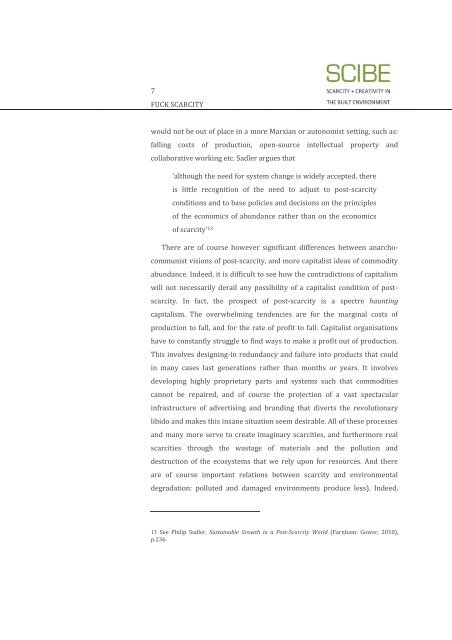FUCK SCARCITY - SCIBE
FUCK SCARCITY - SCIBE
FUCK SCARCITY - SCIBE
You also want an ePaper? Increase the reach of your titles
YUMPU automatically turns print PDFs into web optimized ePapers that Google loves.
7<br />
<strong>FUCK</strong> <strong>SCARCITY</strong><br />
would not be out of place in a more Marxian or autonomist setting, such as:<br />
falling costs of production, open-source intellectual property and<br />
collaborative working etc. Sadler argues that<br />
'although the need for system change is widely accepted, there<br />
is little recognition of the need to adjust to post-scarcity<br />
conditions and to base policies and decisions on the principles<br />
of the economics of abundance rather than on the economics<br />
of scarcity' 13<br />
There are of course however significant differences between anarchocommunist<br />
visions of post-scarcity, and more capitalist ideas of commodity<br />
abundance. Indeed, it is difficult to see how the contradictions of capitalism<br />
will not necessarily derail any possibility of a capitalist condition of postscarcity.<br />
In fact, the prospect of post-scarcity is a spectre haunting<br />
capitalism. The overwhelming tendencies are for the marginal costs of<br />
production to fall, and for the rate of profit to fall. Capitalist organisations<br />
have to constantly struggle to find ways to make a profit out of production.<br />
This involves designing-in redundancy and failure into products that could<br />
in many cases last generations rather than months or years. It involves<br />
developing highly proprietary parts and systems such that commodities<br />
cannot be repaired, and of course the projection of a vast spectacular<br />
infrastructure of advertising and branding that diverts the revolutionary<br />
libido and makes this insane situation seem desirable. All of these processes<br />
and many more serve to create imaginary scarcities, and furthermore real<br />
scarcities through the wastage of materials and the pollution and<br />
destruction of the ecosystems that we rely upon for resources. And there<br />
are of course important relations between scarcity and environmental<br />
degradation: polluted and damaged environments produce less). Indeed,<br />
13 See Philip Sadler, Sustainable Growth in a Post-Scarcity World (Farnham: Gower, 2010),<br />
p.236.




